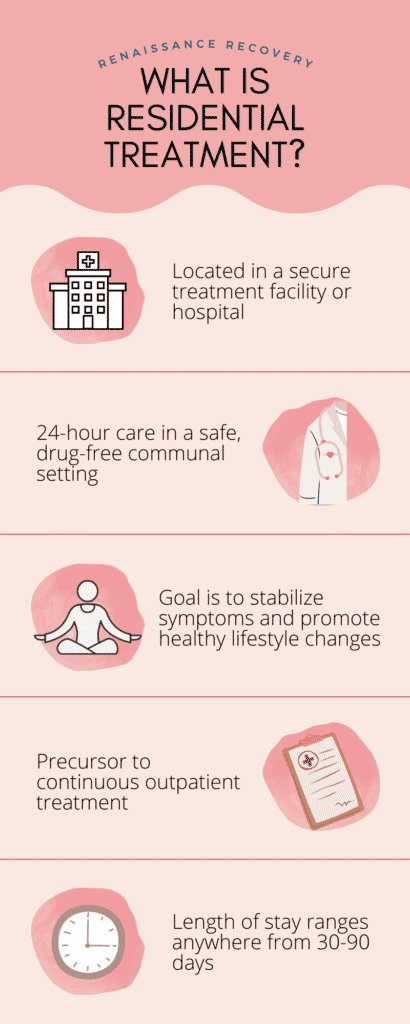For those dealing with a substance abuse problem, it is not uncommon to not know exactly what to look for and how to get help. You may even be trying to find the residential treatment meaning and asking yourself basic questions like “what is residential rehab?” or “what is residential treatment?“
Luckily, there resources to help you make the right decision. One of the best things you can do is contact a treatment professional, like the experts at our Orange County rehab to walk you through the process.
That said, you may be looking for preliminary information. If that’s the case, let’s take a closer look at treatment options such as residential rehab.
What Is Residential Treatment?
One of the most intensive options for substance abuse is residential addiction treatment. When you are learning more about residential treatment, the first thing you are going to notice is that it happens in a secure hospital or treatment facility. Inpatient treatment involves 24-hour care and is the most beneficial for those who are suffering from co-occurring conditions. That could mean these individuals have mental health issues that require consistent monitoring to ensure the patient’s safety and well-being.
Residential treatment’s primary goal is stabilizing symptoms. That way, while patients participate in the program, they can develop a continuous treatment plan. When participating in this treatment, patients receive the care they need in a less intensive setting. Sometimes, a residential treatment program is short-term that lasts from a few days up to one week. Other programs can last for a month up to 90 days.
What is a Residential Treatment Center?
Residential treatment centers will help clients with their addiction problem through a live-in facility that offers around-the-clock care. This differs from a different style of facility, like an intensive outpatient program in the sense that IOPs offer the same style of treatment to people but at specified hours of the day.
What is a Residential Treatment Program?
Those who are about to embark on their journey to recovery may be wondering: what is a residential treatment facility?. In a residential treatment program, people in recovery live on-site at a facility or center for an extended period of time. They receive specialized care and support for their physical, emotional, or mental health issues.
Residential drug treatment programs are typically highly structured and intensive therapy programs, including counseling, education, and other support services.
Residential treatment programs can vary in length from several weeks to several months, depending on the individual’s needs and the nature of their condition. The goal of residential treatment is to provide a safe and supportive environment for individuals to heal and recover, and to equip them with the tools and skills they need to maintain their progress and continue on a path of wellness after they leave the program.
Those attending and intensive outpatient program will come to treatment a few times a week for a few hours a week (specifics will change on a client-to-client basis) whereas a residential treatment center provides clients with programming throughout the entire day and nearly every day of the week.
What to Expect in a Residential Treatment Program
Residential treatment programs aim to promote lifestyle change through a communal living setting. These programs provide a safe, drug-free setting to heal from months or years of substance abuse.
Individuals stay at the facility each night anywhere from 30 to 90 days.
An addiction specialist recommends the most effective length of stay, depending on the situation. For example, those who require dual diagnosis treatment may be advised to stay in treatment longer to heal from addiction and mental health disorders.
What Is Dual Diagnosis?
A dual diagnosis is where a person has a mental health disorder as well as an addiction. It’s common for people to have multiple mental health disorders and multiple addictions. Around half of people with a substance use disorder have had a mental health problem at some point in their lives.
Treating dual diagnosis is a complex matter that requires the skill of an experienced psychiatric professional. There are three main reasons why so many with a substance use disorder have an addiction:
They take substances to escape painful thoughts and emotions.
Their mental health disorder contributes to their addiction as it changes their brain chemistry.
As substance use changes the chemistry of the brain, it can contribute to the development of mental health problems.
A mix of addiction treatment programs and therapies are utilized to rebuild a solid foundation against addiction habits. The most effective treatment programs incorporate mental health treatment and continuing care after rehab.
Medication-Assisted Treatment
Medication-assisted treatment (MAT) is considered the gold standard in drug treatment. This form of treatment is effective because it combines prescription medication and cognitive behavioral therapy.
Medication to reduce cravings and withdrawal symptoms, and cognitive behavioral therapy to transform thought processes that drive the compulsion to drink or take drugs. This combination is very effective in helping people to change their thought processes and learn to form new habits.
Medication-assisted treatment for a minimum of 30 days in residential treatment away from triggers and stressors can be a powerful kick start to a strong and healthy recovery.
What Happens in Residential Treatment Therapy?
Residential treatment therapy provides the unique opportunity to have access to an individualized therapy plan and be away from the influences, stressors, and other aspects of your life so you can fully focus on recovery and self improvement. Residential therapies include CBT, DBT, Relapse Prevention, and an array of other therapy methods to ensure lasting recovery and empowerment.
Cognitive Behavioral Therapy
Cognitive behavioral therapy (CBT) has its roots in psychotherapy. It is a talk-based therapy that helps a person to challenge their thoughts and develop more positive self-beliefs.
Cognitive behavioral therapy is used to treat a wide range of mental health disorders. A skilled therapist can help a person uncover important trains of thought that unconsciously limit them in their day to day life.
The main premise of CBT is that people have negative core beliefs that inform a person’s behavior. These core beliefs most often occur during childhood after adverse childhood experiences (ACEs).
Negative childhood experiences such as verbal abuse, sexual abuse, neglect, or physical abuse can lead a child to believe that they are not good enough. As they grow up, this negative core belief puts the brake pedal on their drive to pursue dreams and ambitions, as they fear failure.
As the child or young person adapts their behavior to their emotional wounds, any rejection further compounds negative beliefs. The self-fulfilling prophecy of negative core beliefs is thought to be the root of many addictions as people self-medicate to escape anxiety and depression.
Cognitive behavior therapy guides a person to:
- Identify their negative core beliefs
- Examine where their negative core beliefs came from
- Understand how their negative core beliefs influence their thoughts, feelings, and behavior
- Develop strategies to reverse the cycle of negative thought cycles
Residential treatment that combines five to seven sessions of cognitive behavior therapy away from triggers is a powerful way to kick start an addicted person’s recovery. By the end of a 30-day program, a person will have learned a great deal about themselves and how to navigate their emotions in times of stress.
Dialectical Behavioral Therapy
The term “dialectical” refers to the ability to entertain multiple viewpoints to arrive at a balanced and sensible conclusion.
Dialectical behavioral therapy encourages a person to manage their emotions better during stressful situations. The therapy was initially developed for people with bipolar disorder who can experience violent mood swings.
This type of residential therapy is a well-established modality that helps people with psychosocial disorders. Dialectical behavior therapy has also been specifically developed for people with substance use disorders, so it is ideal for the residential treatment. Meaning and a sense of self is additionally supported over the course of this process.
A program of this type of therapy trains a person to remain calm and composed in times of distress, and to think things through logically.
Cognitive behavioral therapy differs from dialectical behavior therapy in that cognitive behavioral therapy focuses on thoughts and feelings, while dialectical behavioral therapy focuses on behaviors. A program that incorporates both therapies can be a powerful combination as thoughts, feelings, and behaviors are closely intertwined.
Relapse Prevention Program
Addiction is a chronic relapsing disease that takes patience, determination, and a lot of inner work. A residential treatment program can assist a person to prepare for a life of sobriety.
When a person leaves rehab, the hard work only just begins. A person is typically feeling strong and inspired to tackle challenges when they leave rehab, but as time goes on the stresses of life can erode a person’s resolve.
A relapse prevention program takes treatment a step further with a solid plan for long term sobriety.
Relapse prevention programs educate a person on why a person relapses. There could be several causes of relapse such as isolation, grief, trauma, and stress.
To manage these difficult times, a relapse prevention program creates an aftercare plan. The plan includes a person’s family and friends so that when these times hit, help is on hand.
Holistic Treatment Program
To prevent relapse after rehab, a person needs activities they can turn to that will improve their mood, increase dopamine production, and reduce the need to drink or take drugs.
Residential treatment programs that incorporate holistic treatment programs are considered the best quality programs. By treating the individual as a whole, treatment works so much better in the long run.
Renaissance Recovery offers a range of holistic therapies and activities that soothe the stresses of daily life and give purpose and meaning. These activities include:
- Yoga
- Meditation
- Art therapy
- Music therapy
- Journaling
- Outdoor activities
Holistic activities don’t have to be anything spiritual. Activities that generate a positive mood can be considered to be mindful. Physical exercise, for example, is an excellent mood enhancer. Outdoor sports such as surfing, hiking, or running can be a great boost for the mind and body.
Renaissance Recovery runs a very popular and successful experiential and adventure-based program. Patients at the center can join in on activities such as surfing with their peers. These activities promote peer bonding and get the body moving and pumping feel-good chemicals.
Importance of a Residential Treatment Program
Although residential treatment programs are a single level of rehab care, they can be instrumental in addiction recovery.
Staying away from home for treatment helps individuals focus solely on recovery. They’re removed from known and unknown triggers of addiction, as well as from the stress of work, school, and family. With a body free of drugs and alcohol, the recovery process truly begins.
The importance of a residential treatment program can be seen for years to come. The longer a person stays active in addiction treatment, the better their chances for sober living. Although relapse is part of the process, staying in treatment reduces the risks of returning to old habits.
These modalities are typically incorporated in all types of treatment programs. But, when you stay at a residential treatment center and receive these types of therapies, this increases the likelihood of a successful recovery.
How to Find the Best Residential Treatment Center
When you have learned about residential treatment and are ready to seek help, there are ways to find the best rehab center. High-quality residential treatment centers typically have the following characteristics:
- Accreditation and (or) licensure: States and other entities provide these centers with accreditation and licensure.
- Credentialed staff: In addition to being sensitive to group dynamics, staff must also be sensitive to each patient’s dynamics.
- Access to emergency and urgent care facilities: High-quality facilities have a working relationship with emergency services to keep patients safe.
Many programs and techniques can be utilized for addiction recovery.
Deciding on the correct course of residential therapy can be confusing and overwhelming. Allow our experts to help decide which programs will benefit you or your loved one. They will discuss which level of care is best.
While we don’t offer detox or inpatient services at Renaissance Recovery, we can help clients find relief at Renaissance Recovery’s IOP and outpatient Florida and California rehabs. If you are asking “what is residential treatment?” contact our team today and we can walk you through what it is and help you find the best program for your situation.












